Americans are divided over President Trump's hardball tactics over trade with China as the tariff war threatens to spill into next year. In early October the United States Studies Centre and YouGov polled 1,218 respondents in the United States and 1,039 in Australia, to learn what voters in these two countries thought about key issues in the lead-up to national polls.
Dr Shaun Ratcliff, lecturer in political science at the United States Studies Centre, said there was a great deal of partisan disagreement on the trade war, which has seen tariffs ratcheted on both sides of the Pacific.
“Reflecting support for President Trump’s willingness to use tariffs against China, 81 per cent of Republicans supported increased tariffs on China,” Dr Ratcliff said.
“However, perhaps explaining the president’s willingness to negotiate in Argentina, this trade war will not necessarily be easy to win on the home front. Americans are divided on the issue.
“While most Republicans believe tariffs on imports from China will help the American economy, only 27 per cent of Democrats agree, and fewer than half of all other voters side with the president.”
Dr Ratcliff said this partisan division on trade with China reflects the much greater partisan division observed in American politics.
The USSC-YouGov poll showed similar issues defined policy debates in both countries, but with greater polarisation evident in the United States.
"As we have found in other research, partisans in America are more divided across a broad range of issues than they are in Australia,” Dr Ratcliff said.
“This may make it more difficult for Americans – and American presidents – to reach across the aisle and make common ground.”
In both countries, immigration and the effects of tax cuts were the areas of greatest disagreement between the supporters of major parties.
"Members of the incumbent party — Coalition voters in Australia and Republicans in the United States — were more likely to rate the economy as doing well,” Dr Ratcliff said.
General policy issues
Of the seven general policy issues respondents were asked about, the greatest difference between Democrats and Republicans was on immigration and tax cuts.
53 per cent of American voters agreed or strongly agreed that the United States should accept fewer immigrants. Just 27 per cent of Democratic supporters fell into those categories, compared with 87 per cent of Republicans.
Overall, 53 per cent of American voters agreed or strongly agreed that the United States should accept fewer immigrants. Just 27 per cent of Democratic supporters fell into those categories, compared with 87 per cent of Republicans. On tax cuts for businesses, 58 per cent of Americans agreed they help grow the economy. A third of Democratic supporters agreed, compared with almost all (92 per cent) of Republicans. On no issue was the gap between Democratic and Republican voters less than 40 per cent.
The same two issues were the areas of greatest disagreement between Coalition and Labor voters in Australia. Fifty-nine per cent of voters agreed and strongly agreed that tax cuts for businesses help grow the economy. Most Coalition supporters (79 per cent) agreed, compared with less than half (47 per cent) of Labor voters.
Unlike the United States, there were areas of agreement between Coalition and Labor voters. Three quarters of both supported more spending on infrastructure instead of tax cuts. While almost all Democrats supported this in the United States, most Republicans did not.
International trade and defence alliances
On whether international trade — including trade and investment with China — and US defence alliances were a good deal for America, the major difference was not between Democrats and Republicans, but between supporters of the major parties and other voters (particularly non-voters, who were more likely to think these were not a good deal). Despite Donald Trump’s scepticism, Republicans were particularly supportive of defence alliances. Democrats were more supportive of trade.
....I am a Tariff Man. When people or countries come in to raid the great wealth of our Nation, I want them to pay for the privilege of doing so. It will always be the best way to max out our economic power. We are right now taking in $billions in Tariffs. MAKE AMERICA RICH AGAIN
— Donald J. Trump (@realDonaldTrump) December 4, 2018
Patterns in Australia were similar, although overall support for trade and alliances were higher. Coalition voters were more likely to think defence alliances and international trade in general were good deals for Australia, while there was little difference between them and Labor voters on trade and investment with China in particular.
One Nation voters were less supportive of trade, Greens supporters less supportive of defence alliances. Those who did not know how they would vote were less likely to think any of the three were a good deal.
The state of the economy
Respondents were also asked retrospective and prospective questions on the economy: have things gotten better or worse in the past 12 months, and do they expect them to change for the better worse in the next 12 months.
As with every other question, party polarisation was stronger in the US sample. However, another interesting difference between Americans and Australians was that, regardless of vote, Australians were more positive about the economy going forward. Supporters of all parties in the Untied States were more positive about the past 12 months than they are about the next 12 months. Overall, Americans were more positive about the past and future than Australians.
In both countries, supporters of the party in government — the Republicans in the United States and Coalition parties in Australia — were more likely to say the economy had been doing well and that they believed it would continue to do well.
Another interesting difference between Americans and Australians was that, regardless of vote, Australians were more positive about the economy going forward
Despite low unemployment and high GDP growth, a little under half of American respondents saw the economy as having got better or much better in the past year, and 39 per cent believed it would do so in the next 12 months. This was in part driven by the pessimistic economic views of Democratic voters, of which only 22 and 14 per cent respectively thought the economy had done or would do well. Conversely, more than 80 per cent of Republicans responded in the affirmative on both questions.
In Austalia there was less partisan division on the economy, but more overall pessimism. Only about a quarter of respondents provided positive evaluations of the economy. Even among Coalition voters, less than half were positive, while approximately 20 per cent of Labor supporters shared a positive view of the economy.
Regardless of party they intended to vote for, respondents in both countries who rated the economy as an important or very important issue were also more likely to say they believed it had performed well over the past 12 months and would continue to do so over the next year.
This relationship was weaker for Democratic voters in the United States and Labor supporters in Australia.
Survey overview
In the United States, 40 per cent of respondents said they intended to vote for their Democratic House of Representatives candidate, 35 per cent intended to vote Republican, while 16 per cent said they were unsure and 8 per cent did not intend to vote.
If an Australian election had been held in early October, 33 per cent of respondents said they intended to vote for their Labor House of Representatives candidate, 25 per cent intended to vote Coalition, 12 per cent Greens, 9 per cent intended to vote One Nation, while 15 per cent said they were unsure.
Responses were weighted by YouGov to ensure samples representive of the Australian and US populations. The Australian sample was weighted by age, gender, education, region (crossed with city, non-city) and vote at the 2016 Australian federal election. The US sample was weighted by age, gender, race, education, region, voter registration, and vote choice in the 2012 and 2016 presidential elections.
The margin of error is approximately ± 3 percentage points for results reported for the full sample of both the Australian and American surveys. It is larger for sub-groups of the full samples and for differences between the countries.
Detailed results
Vote intention in the United States and Australia
Vote intention for the House of Representatives at the 2018 US midterm elections
|
Party |
Voters (%) |
|
Democratic |
40 |
|
Republican |
35 |
|
Other |
1 |
|
Not sure |
16 |
|
Not voting |
8 |
Vote intention for the House of Representatives if an Australian election were held in October 2018
|
Party |
Voters (%) |
|
Labor |
33 |
|
Coalition |
25 |
|
Greens |
12 |
|
Other |
7 |
|
One Nation |
9 |
|
Don't know |
15 |
Attitudes towards key issues
United States
American respondents were asked:
- The government should permit more hydraulic fracturing (or fracking) as a means of increasing the production of natural gas and oil
- The government should offer financial subsidies for renewable energy sources, such as solar and wind
- America should accept fewer immigrants
- Tariffs (i.e., levies or fees) on products imported from China will help the American economy
- Tax cuts for businesses help grow the economy
- The differences between the rich and poor have become too large
- Instead of cutting taxes, the government should spend more on infrastructure such as roads, bridges, tunnels, railways, airports and dams
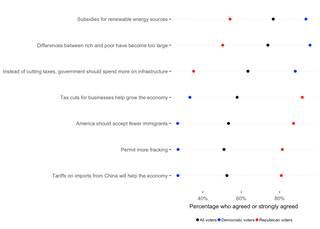
Proportion of American voters who agree with each proposition
|
Issues |
All voters (%) |
Democrats (%) |
Republicans (%) |
Other (%) |
Not sure (%) |
Not voting (%) |
Difference (%) |
|
Instead of cutting taxes, government should spend more on infrastructure |
63 |
88 |
35 |
72 |
67 |
50 |
53 |
|
Differences between rich and poor have become too large |
74 |
96 |
50 |
56 |
77 |
74 |
45 |
|
Subsidies for renewable energy sources |
77 |
94 |
54 |
46 |
82 |
84 |
40 |
|
Tariffs on imports from China will help the economy |
53 |
27 |
81 |
44 |
53 |
47 |
-54 |
|
Permit more fracking |
51 |
27 |
81 |
82 |
43 |
55 |
-54 |
|
Tax cuts for businesses help grow the economy |
58 |
33 |
92 |
83 |
58 |
46 |
-59 |
|
America should accept fewer immigrants |
53 |
27 |
87 |
85 |
47 |
56 |
-60 |
Australia
Australian respondents were asked:
- The government should permit more hydraulic fracturing (or fracking) as a means of increasing the production of natural gas and oil
- The government should offer financial subsidies for renewable energy sources, such as solar and wind
- Australia should accept fewer immigrants
- American tariffs (levies or fees) on products imported from China will be good for the global economy
- Tax cuts for businesses help grow the economy
- The differences between the rich and poor have become too large
- Instead of cutting taxes, the government should spend more on infrastructure such as roads, bridges, tunnels, railways, airports and dams
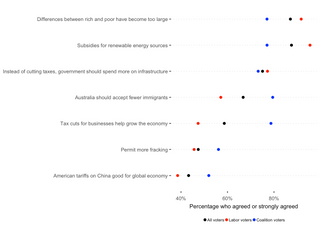
Proportion of Australian voters who agree with each proposition
|
Issues |
All voters (%) |
Labor (%) |
Coalition (%) |
Greens (%) |
Other (%) |
One Nation (%) |
Don't know (%) |
Difference (%) |
|
Subsidies for renewable energy sources |
88 |
95 |
77 |
99 |
72 |
77 |
90 |
18 |
|
Differences between rich and poor have become too large |
87 |
92 |
77 |
95 |
80 |
89 |
88 |
15 |
|
Instead of cutting taxes, government should spend more on infrastructure |
75 |
77 |
73 |
85 |
75 |
69 |
74 |
4 |
|
Permit more fracking |
47 |
46 |
56 |
32 |
44 |
50 |
46 |
-10 |
|
American tariffs on China good for global economy |
43 |
39 |
52 |
36 |
48 |
57 |
35 |
-13 |
|
Australia should accept fewer immigrants |
67 |
57 |
79 |
43 |
84 |
93 |
71 |
-22 |
|
Tax cuts for businesses help grow the economy |
59 |
47 |
79 |
46 |
62 |
52 |
56 |
-31 |
Trade and alliances
United States
American respondents were asked the question:
Are the following a good deal, a bad deal, or neither a good nor bad deal for United States?
- The United States’ defense alliances
- The United States’ international trade agreements
- Trade and investment with China
The options for each question were:
- A good deal for The United States
- A bad deal for The United States
- Neither a good nor bad deal for The United States
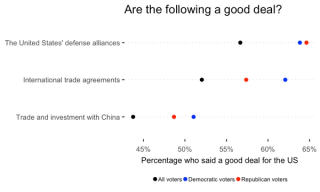
Are the following a good deal, a bad deal, or neither a good nor bad deal for the United States?
|
Issues |
All voters (%) |
Democrats (%) |
Republicans (%) |
Other (%) |
Not sure (%) |
Not voting (%) |
Difference (%) |
|
International trade agreements |
52 |
62 |
57 |
30 |
43 |
34 |
5 |
|
Trade and investment with China |
44 |
51 |
49 |
32 |
40 |
29 |
2 |
|
The United States’ defense alliances |
57 |
64 |
65 |
73 |
46 |
43 |
-1 |
Australia
Australia respondents were asked the question:
Are the following a good deal, a bad deal, or neither good nor bad deal for Australia?
- Australia’s defence alliances
- Australia’s international trade agreements
- Trade and investment with China
The response options for each question were:
- A good deal for Australia
- A bad deal for Australia
- Neither a good nor bad deal for Australia
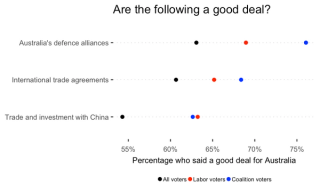
Are the following a good deal, a bad deal, or neither a good nor bad deal for Australia?
|
Issues |
All voters (%) |
Labor (%) |
Coalition (%) |
Greens (%) |
Other (%) |
One Nation (%) |
Don't know (%) |
Difference (%) |
|
Trade and investment with China |
54 |
63 |
63 |
55 |
45 |
36 |
45 |
1 |
|
International trade agreements |
61 |
65 |
68 |
62 |
56 |
46 |
47 |
-3 |
|
Australia’s defence alliances |
63 |
69 |
76 |
45 |
67 |
62 |
52 |
-7 |
The state of the economy
Respondents in both countries were asked retrospective and prospective questions on the economy: have things gotten better or worse in the past 12 months, and do they expect them to change for the better worse in the next 12 months.
The wording of the retrospective question was:
Now thinking about the economy in the country as a whole, would you say that over the past year the nation’s economy has gotten better, stayed about the same, or gotten worse?
- Gotten much better
- Gotten better
- Stayed about the same
- Gotten worse
- Gotten much worse
The wording of the prospective question was:
What about the next 12 months? Do you expect the economy, in the country as a whole, to get better, stay about the same, or get worse?
- Get much better
- Get somewhat better
- About the same
- Get somewhat worse
- Get much worse
United States
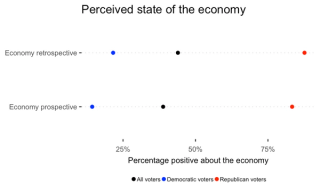
|
Issues |
All voters (%) |
Democrats (%) |
Republicans (%) |
Other (%) |
Not sure (%) |
Not voting (%) |
Difference (%) |
|
Economy retrospective |
44 |
22 |
88 |
85 |
42 |
25 |
-66 |
|
Economy prospective |
39 |
14 |
83 |
32 |
37 |
19 |
-69 |
By salience of the economy as an election issue
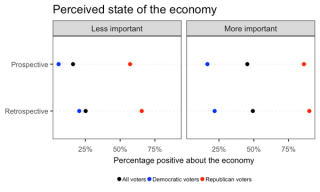
|
Salience |
Retrospective (%) |
Prospective (%) |
|
All voters |
|
|
|
Less important |
25 |
16 |
|
More important |
49 |
45 |
|
Democrats |
|
|
|
Less important |
21 |
6 |
|
More important |
22 |
17 |
|
Republicans |
|
|
|
Less important |
66 |
57 |
|
More important |
90 |
86 |
|
Other voters |
|
|
|
Less important |
50 |
16 |
|
More important |
95 |
37 |
|
Undecided |
|
|
|
Less important |
36 |
15 |
|
More important |
44 |
44 |
|
Not voting |
|
|
|
Less important |
32 |
21 |
|
More important |
20 |
18 |
Australia
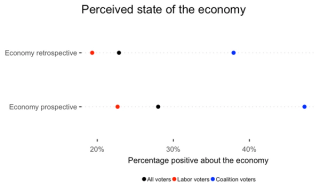
|
Issues |
All voters (%) |
Labor (%) |
Coalition (%) |
Greens (%) |
Other (%) |
One Nation (%) |
Don't know (%) |
Difference (%) |
|
Economy retrospective |
23 |
19 |
38 |
19 |
25 |
18 |
13 |
-19 |
|
Economy prospective |
28 |
23 |
47 |
24 |
29 |
26 |
14 |
-25 |
By salience of the economy as an election issue

Perceived state of the economy by salience
|
Salience |
Retrospective (%) |
Prospective (%) |
|
All voters |
|
|
|
Less important |
14 |
17 |
|
More important |
25 |
30 |
|
Labor |
|
|
|
Less important |
14 |
15 |
|
More important |
20 |
24 |
|
Coalition |
|
|
|
Less important |
14 |
34 |
|
More important |
41 |
49 |
|
Greens |
|
|
|
Less important |
13 |
12 |
|
More important |
23 |
31 |
|
One Nation |
|
|
|
Less important |
23 |
17 |
|
More important |
17 |
28 |
|
Other |
|
|
|
Less important |
20 |
20 |
|
More important |
25 |
30 |
|
Don't know |
|
|
|
Less important |
12 |
13 |
|
More important |
14 |
15 |
Background to the USSC-YouGov poll
In September 2017, the United States Studies Centre announced that it had partnered with global survey company YouGov, which now provides the Centre with exclusive, monthly polling data from the United States and Australia; tracking perceptions of political leadership in both countries, and unique, targeted insights on a diverse range of topics.
CEO of the United States Studies Centre Professor Simon Jackman, a leader in public opinion research, has previously worked as one of the principal investigators of the American National Election Studies and partnered with media outlets including the Guardian Australia and the Huffington Post on pre-election polling. He said the results provided by YouGov as part of the new partnership will allow the Centre to analyse and publish unprecedented comparative data.
“The United States Studies Centre has taken a keen interest in the attitudes and opinions of people in our region, with research like our surveys into America’s role in the Indo-Pacific. This exciting new partnership with YouGov gives us the opportunity to broaden that focus to public opinion in the United States and then contrast that with the views of people in our own backyard,” Jackman said. “The Centre has a mandate to deepen Australia’s understanding of America. This ongoing commitment to charting public perceptions in both countries is an ideal way for Australians to gain perspective on the United States.”
YouGov is a market research and opinion polling company headquartered in the United Kingdom, with operations in Europe, North America, the Middle East and the Asia-Pacific.








